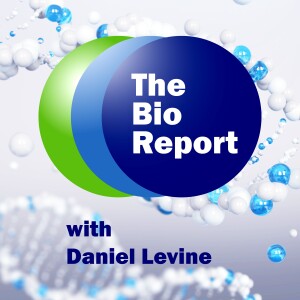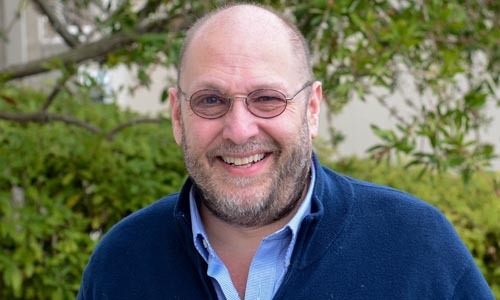
The Bio Report podcast, hosted by award-winning journalist Daniel Levine, focuses on the intersection of biotechnology with business, science, and policy.
The Bio Report podcast, hosted by award-winning journalist Daniel Levine, focuses on the intersection of biotechnology with business, science, and policy.
Episodes

3 days ago
A Strategic Turn from Obesity to Cancer
3 days ago
3 days ago
When Amy Burroughs stepped in as CEO of Terns Pharmaceuticals, she not only had to fill a void created by the death of her predecessor, but also lead a strategic shift from an increasingly crowded area of metabolic disease to focus on its experimental therapy for chronic myeloid leukemia. The company’s allosteric BCR-ABL inhibitor binds to a different site on the fusion protein than most first- and second-generation tyrosine kinase inhibitors. The data have the company and its investors believing the drug can reset the bar for both efficacy and tolerability in a multibillion-dollar market. We spoke with Burroughs about reinventing the company, the decision to seek partners for non-core assets, and how she is charting a clear path toward a broader oncology future.

Wednesday Feb 11, 2026
A One Two Gene Therapy Punch to Non-Muscle Invasive Bladder Cancer
Wednesday Feb 11, 2026
Wednesday Feb 11, 2026
A One‑Two Gene Therapy Punch to Non-Muscle Invasive Bladder Cancer
Non–muscle invasive bladder cancer is a common, slow-progressing form of bladder cancer that makes up a majority of the roughly half a million new cases diagnosed each year. For decades, doctors have relied on a weakened bacterium called BCG, an intravesical immunotherapy, as a standard treatment for early-stage disease, but it fails in about 30 to 40 percent of patients. EnGene is taking a different approach with detalimogene, an experimental, non-viral gene therapy designed to trigger a powerful but localized immune response right where the cancer lives in the bladder. We spoke with Ron Cooper, CEO of EnGene, about this therapy for non–muscle invasive bladder cancer, how its dual payload is meant to activate both an innate and adaptive immune response in the bladder, and the company’s $130 million financing at the end of 2025.

Wednesday Feb 04, 2026
Reprogramming T Cells to Cross the Brain’s Border
Wednesday Feb 04, 2026
Wednesday Feb 04, 2026
One of the challenges of treating brain tumors is delivering potent biologic therapies across the blood-brain barrier. Adaptin Bio has developed platform technology that harnesses a patient’s own T cells to transport bispecific therapeutic payloads across the blood-brain barrier and into other targeted tissue with an initial focus on treating glioblastoma. We spoke to Michael Roberts, co-founder and CEO of Adaptin Bio, about the unmet need in glioblastoma, the limitations of current blood-brain barrier–crossing strategies, and how the company’s platform seeks to change the treatment paradigm by using patient-derived T cells as delivery vehicles for targeted biologics.

Wednesday Jan 28, 2026
A Billion-Dollar Bet on AI-First Drug Development
Wednesday Jan 28, 2026
Wednesday Jan 28, 2026
Despite the emergence of new modalities and drug development technologies, the cost and time to produce new therapies has changed little, and failure rates remain high. Xaira aims to change that with a systematic, AI‑driven approach that tackles three pervasive bottlenecks—choosing the right targets, designing the right molecules, and matching the right patients—by running as much work as possible in silico and using high‑dimensional causal datasets to train “virtual cell” foundation models. The company is initially focusing on high‑value, historically undruggable targets and ultimately on building a pipeline of differentiated biologics. We spoke with Marc Tessier‑Lavigne, co‑founder and CEO of Xaira, about applying end‑to‑end AI across target discovery, molecular design, and patient stratification; the company’s more than $1 billion in funding, and how it seeks to enable a new generation of scientists fluent in both AI and biology.

Wednesday Jan 21, 2026
Finding New Targets on the Surface of Misfolded Proteins
Wednesday Jan 21, 2026
Wednesday Jan 21, 2026
Finding New Targets on the Surface of Misfolded
One of the biggest hurdles in drug development is targeting proteins found in both healthy and diseased cells without triggering toxic side effects. In cancer, this challenge often translates into narrow therapeutic windows, collateral damage to normal tissues, and forced dose reductions that limit efficacy. The result is a crowded field where many companies chase the same well-known targets, leaving vast patient populations without effective options. Immuto Scientific is taking a different approach. The company is redefining how targets are identified—focusing not on genetic sequence, but on disease-specific protein conformations. By studying the structural shapes that proteins take in malignant cells, Immuto aims to distinguish cancerous from healthy tissue, broaden therapeutic windows, and unlock new or previously undruggable targets across oncology and beyond. We spoke with Faraz Choudhury, co-founder and CEO of Immuto Scientific, about the company’s AI-enabled structural surfaceomics platform, how it allows drugs to selectively home in on diseased cells while sparing normal ones, and Immuto’s plans to extend its science into immunology and inflammation.
Proteins

Wednesday Jan 14, 2026
Targeting Tumors from the Inside Out
Wednesday Jan 14, 2026
Wednesday Jan 14, 2026
Systemic chemotherapy remains the foundation of cancer treatment, but its widespread toxicity too often cuts short potential therapeutic benefits. NanOlogy is developing a new approach—localized cancer therapy that keeps the drug where it’s needed most. We spoke to Marc Iacobucci, managing director of Nanology about the company’s precision particle engineering platform, how it transforms existing oncology drugs into microparticles optimized for intratumoral delivery; and how this enables sustained, high-concentration dosing inside tumors that destroys cancer cells, stimulates immune responses, and spares patients the debilitating effects of systemic chemotherapy.

Wednesday Jan 07, 2026
An Effort to Detect and Treat Alzheimer’s at Its Earliest Stages
Wednesday Jan 07, 2026
Wednesday Jan 07, 2026
One of the challenges in treating the neurodegenerative condition Alzheimer’s disease is intervening early enough in the course of illness to provide meaningful benefit. AltPep is developing therapeutics with companion diagnostics that target toxic α-sheet–containing oligomers, which are thought to form very early in the disease and act as molecular triggers of downstream amyloid pathology. These structures are believed to represent some of the earliest detectable stages of Alzheimer’s and to promote the formation of amyloid plaques, a hallmark feature of the condition. We spoke with Valerie Daggett, founder and CEO of AltPep, about the relationship between α-sheet oligomers and the onset of Alzheimer’s disease, how the company’s synthetic peptides are designed to bind and neutralize these pathogenic agents, and the potential for this platform to be extended to a broader set of amyloid diseases.

Wednesday Dec 31, 2025
The Year in Biotech and What’s Ahead for 2026
Wednesday Dec 31, 2025
Wednesday Dec 31, 2025
Biotech stocks staged a dramatic turnaround in 2025, with the XBI well outpacing the S&P 500 despite concerns over leadership changes at the U.S. Food and Drug Administration, the Trump administration’s efforts to put constraints on drug pricing, and its broader cuts to health and science agencies. A pick-up in deal-making, along with falling interest rates, helped buoy the sector with growing anticipation for continued improvement in 2026. We sat down with Adam Feuerstein, senior biotech writer for STAT, for our annual review-preview edition, the noteworthy trends in the biotech sector 2025, and what’s in store at the upcoming JPMorgan Healthcare Conference and beyond in 2026.

Daniel Levine
Daniel Levine is an award-winning business journalist who has reported on the life sciences, economic development, and business policy issues throughout his career. He is founder and principal of Levine Media Group, host of The Bio Report and RARECast podcasts, a senior fellow at the Center for Medicine in the Public Interest, and author of Global Genes’ annual NEXT report on emerging trends in the world of rare disease. From 2011 to 2014, he served as the lead editor and writer of Burrill & Company’s acclaimed annual book on the biotech industry. His work has appeared in numerous national publications including The New York Times, The Industry Standard, and TheStreet.com.
